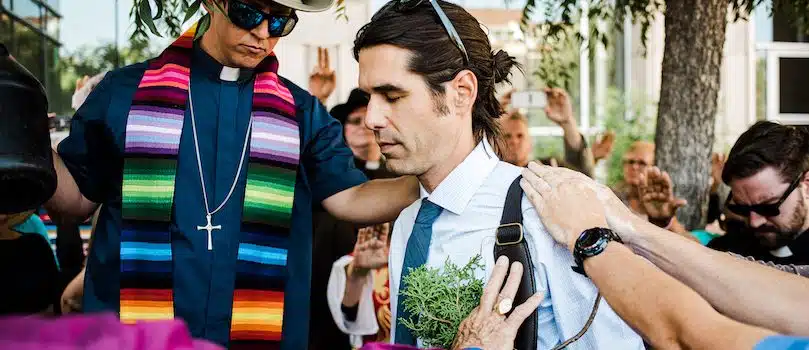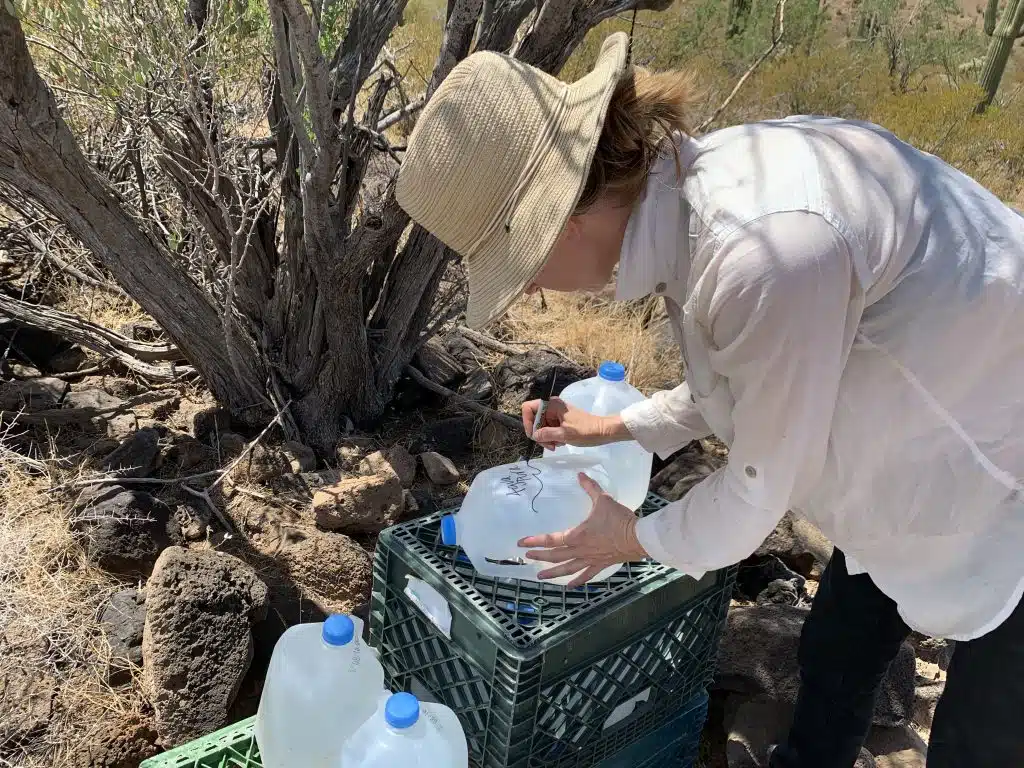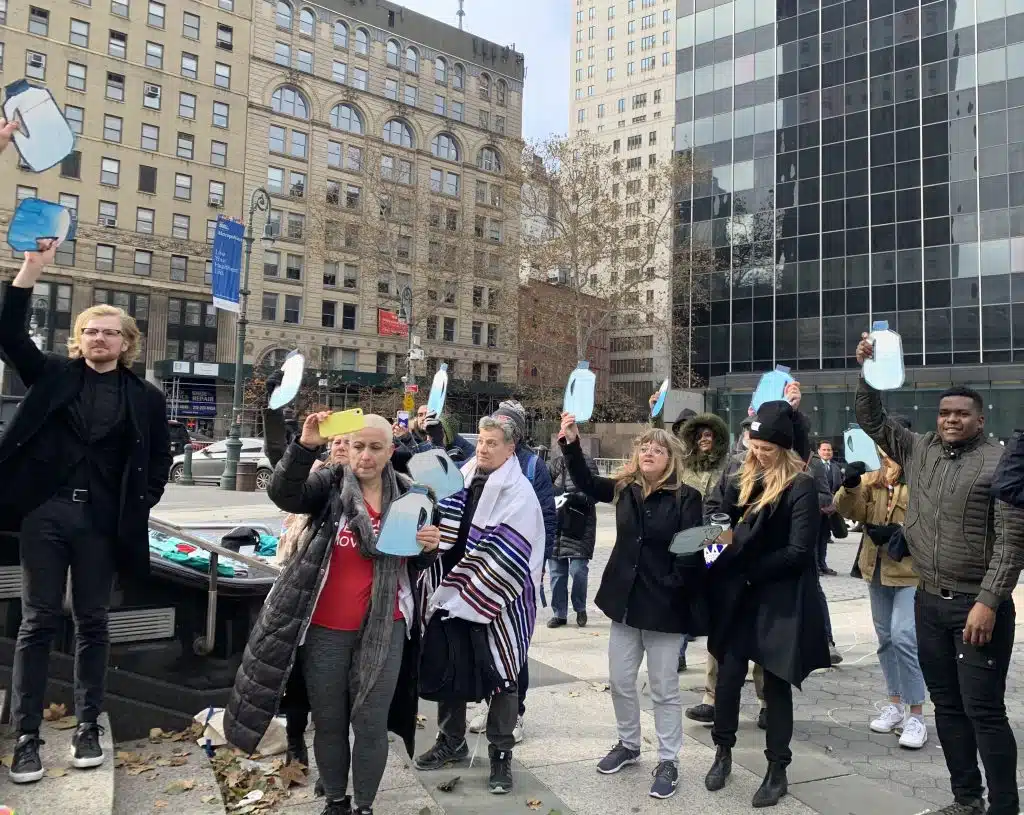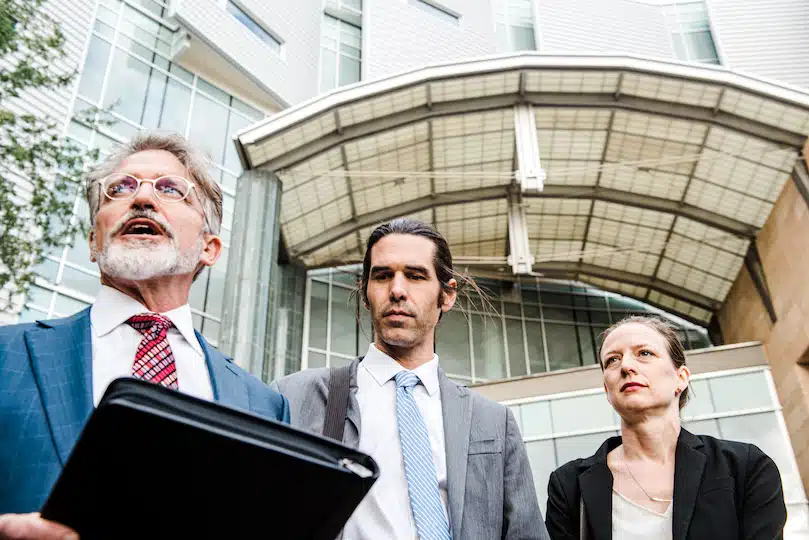Border residents wanted to prevent deaths. Instead, they were accused of crimes.
Most religions teach people to help those in need. But what happens when that mandate clashes with how the government views the law? In this story, we hear how federal prosecutors have cracked down on volunteers providing aid on the border, including Scott Warren, who faced 20 years in prison.
This story originally aired on KALW in June 2020 and was produced in partnership with KALW’s The Spiritual Edge and USC’s Center for Religion and Civic Culture. The story also aired on Interfaith Voices in October 2020 and was part of the first season of KALW’s Spiritual Edge podcast, Sacred Steps, in July 2021. It won third place in the radio category from the Religion News Association in 2021.
Top photo and bottom right photo by Ash Ponders. Music in the piece is by Blue Dot Sessions.
The desert near the Arizona-Mexico border can get brutally hot, and the August day I visited with Scott Warren and Emily Saunders was no exception. Migrants who have just crossed into the United States without papers hike through the area.
Thousands have died trying.
Warren and Saunders carried large backpacks, heavy with plastic water jugs and easy-open cans of beans. They left the supplies in the desert, in the hope the water and food will be of help to people who just crossed the U.S. border.
“Coming out into the desert to put water here does humble me and reminds me just how treacherous and deadly this desert is,” Saunders said. “As beautiful as it is.”
Saunders and Warren, who were partnered at the time, belong to a network of at least 200 humanitarian aid volunteers in the region. Ajo Samaritans is one group they volunteer with. No More Deaths is another.
They live in the small desert town of Ajo, just north of the border. Warren is a geographer who teaches courses about the borderlands. Saunders is a licensed clinical social worker and mental health provider.
Almost everywhere volunteers leave water in the desert, they’ve also found people who have died, Warren said.
The remains of more than 3,000 migrants have been recovered in the Southern Arizona desert over the last 20 years. By August of 2019, Warren had helped recover 18 of those bodies.
“I think there is something sacred about like the exchange of water in the desert in particular and food too, but especially water,” Warren said. “It’s so basic.”
Yet the same actions Warren and Saunders consider sacred have put them and other volunteers in the crosshairs of authorities who have accused them of breaking the law.
***
In 2017 and 2018, as the Trump administration made tough border and immigration policies its trademark, federal law enforcement started to crack down on humanitarian aid in the Arizona desert.
Warren was one of nine volunteers charged with misdemeanors for driving into a restricted part of the Cabeza Prieta National Wildlife Refuge and leaving water jugs there.
Then, in January 2018, Warren dropped by a house humanitarian aid volunteers use in Ajo and discovered two men from Central America there, Kristian Perez-Villanueva from El Salvador and José Arnaldo Sacaria-Goday from Honduras. Warren gave them food, water, and first aid. When Perez-Villanueva and Sacaria-Goday decided to keep walking a few days later, Warren stood with them in the driveway and oriented them.
He said he was pointing out how to find the highway should they need help.
Warren didn’t know that Border Patrol agents had been surveilling him. The agents swooped in and arrested him and Perez-Villanueva and Sacaria-Goday. The agents accused Warren of harboring the men, and helping them evade Border Patrol.
“That was my first experience being arrested and going through that process of of being arrested, and detained and and handcuffed,” Warren said. “It was a really difficult experience, one that I knew about in an academic way but hadn’t experienced that before.”
He added, “I didn’t know what was happening, how that was going to end.”
At the federal courthouse where he was arraigned, he shared a cell with migrants and asylum seekers the authorities had just caught crossing the border.
“I could see that many of them were very scared, you know, and concerned as well. So I was both scared for my own situation and also very concerned for those around me,” Warren said.
Warren was 35. If found guilty, he could face 20 years in federal prison. The government charged him with two felony counts of harboring and one count of conspiracy to transport migrants. He had become a symbol in the federal government’s border crackdown.
Not only was Warren’s future in jeopardy, so was the legal fate of humanitarian aid on the border.
***
In March and April 2019, as Warren prepared for upcoming federal trials, Saunders felt federal law enforcement targeted her, as well.
She had volunteered a few times to observe at the border when asylum seekers walked from the Mexican side of the border up to the Lukeville, Arizona port of entry to ask for protection. Saunders said when she did this, a U.S. Customs and Border Protection officer questioned her, confiscated her belongings for a few hours and accused her of aiding human trafficking.
In another incident, the officer briefly arrested another volunteer observing the asylum process. That volunteer, Ana Adlerstein, sued the federal agency. In court papers, the officer confirmed he believed he could arrest her under the federal harboring statute. A spokesperson for the agency declined to comment, citing pending litigation.
There is a long history of people in the borderlands providing humanitarian aid to migrants. But as word spread about the arrests of Warren and other humanitarian aid volunteers, it caused people living on the border to question what they can and cannot legally do.
José Castillo, who has lived in the Ajo area for more than 80 years, recalled how in 1980 the entire town rallied to search and pray for a group of Salvadoran migrants lost in the nearby desert.
Castillo said he cannot imagine denying life-saving aid to migrants who knock on his door asking for food and water. “How can you be asking somebody who is hungry where you from?” he wondered.
***
In May and June of 2019, Warren had back-to-back trials in federal court in Tucson—first on the misdemeanor charges related to leaving water in the Cabeza Prieta National Wildlife Refuge, then on the felony charges for harboring and conspiracy.
In the misdemeanor case, Warren’s team of pro bono lawyers tried something unusual—a religious freedom defense.
Warren doesn’t identify with any organized religion. But he says his spirituality informs his actions. He argued he drove on a restricted road and left water in the wildlife refuge because his sincerely held beliefs compelled him to try and save lives. And the government’s laws forbidding it burdened his religious practice.
This is based on a 1993 law, known as the Religious Freedom Restoration Act. The law has become associated with the conservative Christian right. Famously, The Hobby Lobby retail chain used the law to justify not paying for its employees’ birth control.
Warren’s lawyer Amy Knight acknowledged it is rare to see the religious freedom defense used for progressive causes, or by defendants not affiliated with an established religion.
“We might as well at least make it cut both ways, and say, you know, if you want to have this law, you have to accept that it recognizes all religions, not just your religion,” Knight said in an interview.
***
On June 5, 2019, Warren testified in his own defense at his felony trial for harboring and conspiracy.
That morning, the courtyard in front of the federal courthouse in Tucson was filled with Franciscan monks in brown robes, Buddhist monks in yellow robes, Catholic nuns, rabbis, imams, priests, ministers and pastors.
Federal prosecutors declined to be interviewed for this story. In court, they said the men Warren helped were not at risk of dying, and accused Warren of being in on a plan to transport them north.
Faith leaders called the prosecution of Warren and other No More Deaths volunteers an assault on their religious freedom.
“Our very salvation will be based on whether we can say, ‘Yes Lord, we gave them water. Yes Lord, we gave them food. Yes, we gave them shelter,’” said Presybeterian minister Alison Harrington at a rally outside the courthouse.
“Up in that building, they may call it a crime, they may call it harboring, but we call it a fundamental practice of our faith,” Harrington said.
She pointed out that history seemed to be repeating itself. “And they’d come for us in the past right, John? John Fife is here also face federal charges,” she said.
She motioned toward a tall, white haired man in the crowd, Rev. John Fife, a retired Presbyterian minister. He helped found the Sanctuary Movement in the 1980s, in which hundreds of churches and synagogues protected Salvadoran and Guatemalan asylum seekers from deportation. Federal law enforcement infiltrated the religious movement, and John Fife was convicted on smuggling charges and sentenced to probation. He later went on to help found No More Deaths.
Inside the courtroom, on the witness stand, Warren said he had not expected to find Perez-Villanueva or Sacaria-Goday in the house when he stopped by. He said his intent, once he found them there, was to relieve their suffering and treat them as he would any human being at his door. He said he followed legal protocols.
He testified that in the 1990s, federal immigration officials instituted a policy called Prevention Through Deterrence, to push migration to more remote areas, like the Arizona desert. Officials at the time though illegal immigration would peter out as a result, but instead, the number of people who died trying to get into the country surged.
Warren explained his spiritual connection to humanitarian aid and his drive to prevent more border deaths.
Federal prosecutors told the jury the testimony about deaths in the desert was just a “smokescreen.”
The jurors deliberated for three days. When they were done, eight wanted to acquit Warren. Four want to convict him. It was a hung jury—a mistrial.
Two weeks later, Warren’s supporters lined the sidewalk next to the federal courthouse demanding prosecutors drop the charges.
Instead, prosecutors only dropped the conspiracy charge and announced they would try a second time to convict Warren for two counts of harboring.
***
When Warren’s second felony trial began in Tucson in November, 2019, his case had gathered enough notice that a group of supporters rallied for him in Manhattan.
One man in the crowd, a musician named Pablo Suazo, had a special interest in Warren’s trial.
Suazo said in Spanish that he is from Honduras and came to the United States seeking asylum. In 2012, he and two brothers walked through the Arizona desert to make it into this country.
They got lost and dehydrated. Then, they found water. Gallon jugs of water volunteers had left, along with kind notes in marker.
“Finding water was like a blessing from God, or magic,” Suazo said. “It was incredible.”
Suazo believes that water is why he is alive today. But his brothers died on the journey. He said humanitarian aid volunteers helped recover one brother’s remains.
Suazo fought back tears as he said he is grateful, and that is why he wants to do what he can to support Scott Warren.
“We won’t rest,” he said, “until our compañero is free.”
***
That afternoon in Tucson, on Nov. 20, 2019, the jury found Warren not guilty on both counts.
“Our basic values stand,” Saunders later recalled. “Twelve people, twelve jurors saw the truth. And it is relieving. It’s empowering for people. And yeah, it’s exciting.”
The same day, U.S. District Court Judge Raner Collins issued his ruling in the earlier misdemeanor case against Warren. Collins wound up acquitting Warren on the abandonment of property charge, and agreed the Religious Freedom Restoration Act defense was valid.
It was the first time a federal judge had approved religious freedom as a defense for a crime related to border humanitarian aid. Then a different federal judge, also relying on religious freedom, reversed the earlier convictions of four other No More Deaths volunteers who had also left water in the Cabeza Prieta National Wildlife Refuge.
“That was pretty exciting,” Warren said.
Federal prosecutors wound up dropping the final remaining misdemeanor charge against Warren for driving on a restricted road without a permit. That meant Warren beat all the charges against him.
“There is now some legal precedent that protects people that live in the borderlands who choose to provide humanitarian aid in the way that Scott did,” Saunders said.
Yet the US Attorney for Arizona, Michael Bailey, has vowed to keep prosecuting what he calls “open border groups” if they help migrants evade the Border Patrol. He explained his position in an interview on public radio station KJZZ.
“When you’re falsely calling what is essentially harboring ‘humanitarian aid,’ then it falls under the harboring statute, and it is fair game for prosecution,” Bailey said. “When we confront that, we absolutely have a responsibility to prosecute it.”
***
In the first half of 2020, Warren recovered the remains of five more migrants in the desert. Federal policies that took effect after the COVID-19 pandemic hit make it impossible for most immigrants to enter the country legally or ask for asylum.
President Donald Trump’s border wall is going up just south of Ajo. Bulldozers are destroying saguaro cactuses and sacred native sites. These developments are painful for Warren to think about.
“There’s despair, but that’s been what the border’s been about for a long time,” Warren said. “So that resistance I think just continues.”
Recently, Warren and Saunders decided to separate. But they remain close, and committed to humanitarian aid. They know for some people desperate to get into this country right now, the Arizona desert is one of the only paths available.
And they say they will keep trying to make that desert crossing less deadly.
***



